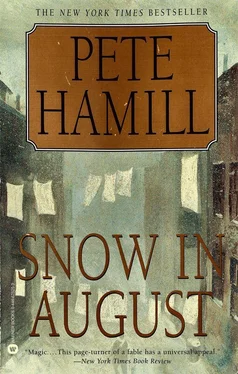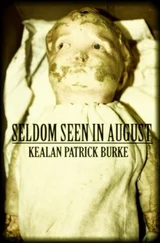Pete Hamill - Snow in August
Здесь есть возможность читать онлайн «Pete Hamill - Snow in August» весь текст электронной книги совершенно бесплатно (целиком полную версию без сокращений). В некоторых случаях можно слушать аудио, скачать через торрент в формате fb2 и присутствует краткое содержание. Год выпуска: 2009, ISBN: 2009, Издательство: Grand Central Publishing, Жанр: Современная проза, на английском языке. Описание произведения, (предисловие) а так же отзывы посетителей доступны на портале библиотеки ЛибКат.
- Название:Snow in August
- Автор:
- Издательство:Grand Central Publishing
- Жанр:
- Год:2009
- ISBN:9780446569668
- Рейтинг книги:3 / 5. Голосов: 1
-
Избранное:Добавить в избранное
- Отзывы:
-
Ваша оценка:
- 60
- 1
- 2
- 3
- 4
- 5
Snow in August: краткое содержание, описание и аннотация
Предлагаем к чтению аннотацию, описание, краткое содержание или предисловие (зависит от того, что написал сам автор книги «Snow in August»). Если вы не нашли необходимую информацию о книге — напишите в комментариях, мы постараемся отыскать её.
Snow in August — читать онлайн бесплатно полную книгу (весь текст) целиком
Ниже представлен текст книги, разбитый по страницам. Система сохранения места последней прочитанной страницы, позволяет с удобством читать онлайн бесплатно книгу «Snow in August», без необходимости каждый раз заново искать на чём Вы остановились. Поставьте закладку, и сможете в любой момент перейти на страницу, на которой закончили чтение.
Интервал:
Закладка:
“I wanted to go, right away to leave,” he said, as Michael imagined his movements through Prague. “But Leah, she was out there, someplace. I knew this, I believed this, I hoped this.”
Before leaving, Mr. Fishbach had told him there would be a final meeting at the Old-New Synagogue at four in the morning. The doors were locked, but there was a tunnel in the basement of a house down the street. Then Michael was moving through the fog with Rabbi Hirsch, dodging Nazis, avoiding streetlamps, wary of informers, plunging into the ghetto, along the streets he knew so well. They went into the modern apartment house that had been erected on the site of the old Fiinfter Palast. Then into the basement, where a man was waiting, showing him the hidden door, and then through tunnels, dripping and dank, and into the Old-New Synagogue. Rabbis were praying. Young rabbis were making disguises. Old rabbis stared at the walls. The leaders began making frantic arrangements to smuggle out the most holy artifacts from the Old-New Synagogue, to hide them in the mountains, or somehow move them to Palestine. Michael thought about the attic, the sealed room, the two tiny coffins, the silver spoon.
And then a young man from the underground appeared, explained what they all must do to escape, and at the end, called Rabbi Hirsch to the side.
“He tells me at the Polish border, Leah has been arrested. Leah and two others. By the Gestapo. They find two guns and Zionist writings.”
He was quiet for a long moment. As if imagining what had been done to his wife.
“I never see her again,” he said.
Kate Devlin reached out and touched his shoulder, to steady him. Then she quickly withdrew her hand, as if the rabbi might think her gesture inappropriate.
“Later, we heared that she died in a camp.”
“Good God,” she said.
“No, Mrs. Devlin. God was not good.”
Michael thought: He doubts God. Here it is again. He’s a rabbi and he doubts the goodness of God. Michael realized that he had been holding a piece of pound cake in his hand for a long time. He eased it toward his mouth. Thinking: how can he still be a rabbi if he doubts God?
“And you, Rabbi Hirsch?” Kate Devlin said. “How did you get away?”
“Very simple,” he said, without pride. “I ran.” Then he shrugged. “Or better, I walked. I walked to the mountains and traded my clothes with a woodcutter. I shave the hair off my head, so that now I am bald and without a beard.” He turned to Michael. “Like Brother Thaddeus.” A small smile. “Everything black, I throwed away. My identity papers I burned. My father’s picture, this too. Anybody looking at him, he’s a Jew. All I have is in my little bag, a picture of Leah, a few shirts, a toothbrush. I walked and hid, like an animal that is lost.”
He walked through Romania. He walked through Yugoslavia. He walked all the way to Greece. In Piraeus, he eventually boarded a ship going to the Dominican Republic, where a dictator named Trujillo was accepting Jews, because he thought there were too many black people in his country. Rabbi Hirsch lived in the Jewish colony the Dominicans called Sosua. He was one of the rabbis. The sun was hot. The beaches were white. He stayed for the duration of the war.
“And that’s it, the story of my life,” Rabbi Hirsch said. He smiled in a tentative way and sipped his wine. “Or like they say in Sosua, la historia de mi vida . Some Spanish I learned there too. I built some houses. I fished in the sea. I read all the time, newspapers in Spanish and English, Time magazine. My books, most of them were sent from Palestine, and so I have them there too, have Prague in the books.” He tapped his forehead. “And here too.”
He ran his tongue over his lips as if cleaning the residue of the wine.
“The colony in Sosua? A failure. City people, we are not good farmers. When the war ends, most of the Jews leave. I stay a little longer, but last year I camed here, when from Brooklyn the synagogue put a notice in the paper for a rabbi.” He shook his head slowly. “How do you say? That’s all there is to it. The ball game is over. Nada más .”
Michael glanced at the clock over the stove. Almost midnight. He was exhausted, but he wanted the night of confession and disclosure to go on and on.
“Are you absolutely certain, Rabbi, that your wife is dead?” Kate Devlin said calmly.
The rabbi was slumping now, his face drawn.
“One guy, I met him in Ellis Island, right out there,” he said, motioning with his wine glass to the window and the distant harbor. “He tells me he is in the underground with Leah. And he says she shot three Nazis when they try to arrest her, and so they don’t kill her. Killing her is like mercy. They keep her alive, in the Gestapo building. And when they are finish with her, they send her to the camps. Maybe Treblinka. Maybe Auschwitz. Nobody knows.”
“But there must be some records,” Kate said.
“After the war, letters I wrote to the Americans, the British, even the Russians,” he said. “In German I wrote, in Czech, in my not good English.” His body slumped lower in the chair. “To nobody I wrote in Yiddish. Nobody is left alive to read it.” He took a deep breath, then let it go. “To Prague I wrote, to Vienna, to Warsaw, to the Jewish agencies in Tel Aviv. Everywhere, I wrote. All have her name on the same lists, just one name with millions of others. Dead, they say. No details. Just one word. Dead . In different languages. Same meaning.”
The rabbi looked at Michael’s face and touched his blackened skin and shook his head. Kate got up and went into the bathroom, closing the door behind her. Michael stared at the older man.
“Rabbi?” he whispered.
“Yes?”
“When you went to the meeting in the Old-New Synagogue?”
“Yes?”
“Why didn’t you make the Golem?”
The rabbi turned his head and gazed out the open window at the nighttime city and the distant skyline of Manhattan.
“This I think about all the time,” he said softly. “Maybe…”
He didn’t finish the sentence because Kate returned from the bathroom and sat down facing him. Her eyes were swollen and pink. The pint bottle of wine was almost empty. She shared the last inch with Rabbi Hirsch.
“Your wife was a hero, Rabbi,” Kate Devlin said in a consoling way. Michael noticed a slight crack in her voice, a tremble.
“Yes. You said it. A hero.”
“And if you ask me, you are too,” she said.
“No.”
“Yes, you are.”
“Leah, yes. Your husband, yes. But me? A hero? Neyn. Keyn mol . No.”
She sipped the wine, her eyes full of concern and doubt, but in some way holding back. It was as if one question had been rising to her tongue across the long evening and she couldn’t let Rabbi Hirsch leave without asking it. Michael watched her, waiting for her to speak.
“Do you still believe in God, Rabbi?” she said at last.
His face looked drained and pale. He shook his head from side to side.
“I believe in sin,” he said, and finished his wine. “I believe in evil.”
28
At the door, before setting out on his return journey through the parish, Rabbi Hirsch suddenly stopped and searched through his pockets. “ Vart a minut … wait a minute. Ah, here!” He waved a small envelope, smiled, then removed two tickets. To Ebbets Field.
“For us,” he said. “To see Jackie!” The rabbi’s face brightened as he remembered a song from the radio. “We will buy peanuts and Cracker Jacks, and I don’t care if we ever get back!”
Michael could only mumble his thanks, unable to speak up. The rabbi had told him that he’d never seen a baseball game, not even in the Dominican Republic. But Michael had never been to a professional game either; most kids in the parish saw their first game with their father. The boy had played ball. He had watched sandlot games at the Parade Grounds, on the far end of Prospect Park. But the great ballplayers of the Dodgers lived in newsreels, on the radio, on the other side of the gates of Ebbets Field. He had thought he would finally see the Dodgers with Sonny and Jimmy, once school was over. But things had gone wrong. He might never even see Sonny and Jimmy again. Now here comes Rabbi Hirsch. This wonderful man. With tickets to Ebbets Field. Together we’ll see the Dodgers. And Jackie Robinson. Oh, jeez. He turned his head, afraid the rabbi would see the tears in his eyes.
Читать дальшеИнтервал:
Закладка:
Похожие книги на «Snow in August»
Представляем Вашему вниманию похожие книги на «Snow in August» списком для выбора. Мы отобрали схожую по названию и смыслу литературу в надежде предоставить читателям больше вариантов отыскать новые, интересные, ещё непрочитанные произведения.
Обсуждение, отзывы о книге «Snow in August» и просто собственные мнения читателей. Оставьте ваши комментарии, напишите, что Вы думаете о произведении, его смысле или главных героях. Укажите что конкретно понравилось, а что нет, и почему Вы так считаете.












